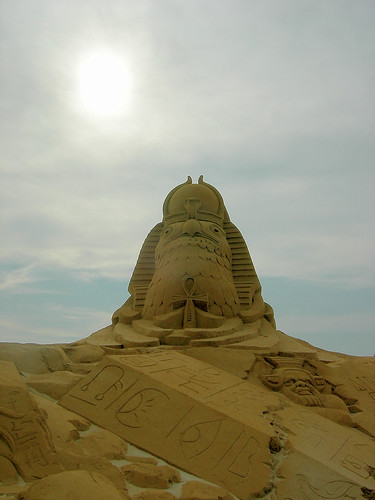
Orus, originalmente cargada por mathilde04.
Sky god
Horus is the god of the sky, and the son of Osiris. His mother is Isis.
Since he was god of the sky, Horus became depicted as a falcon, or as a falcon-headed man, leading to Horus' name, (in Egyptian, Heru), which meant The distant one. Horus was also sometimes known as Nekheny (meaning falcon), although it has been proposed that Nekheny may have been another falcon-god, worshipped at Nekhen (city of the hawk), that became identified as Horus very early on. In this form, he was sometimes given the title Kemwer, meaning (the) great black (one).
As Horus was the son of Osiris, and god of the sky, he became closely associated with the Pharaoh of Lower Egypt (where Horus was worshipped), and became their patron. The association with the Pharaoh brought with it the idea that he was the son of Isis, in her original form, who was regarded as a deification of the Queen.
It was said that after the world was created, Horus landed on a perch, known as the djeba, which literally translates as finger, in order to rest, which consequently became considered sacred. On some occasions, Horus was referred to as lord of the djeba (i.e. lord of the perch or lord of the finger), a form in which he was especially worshipped at Buto, known as Djebauti, meaning (ones) of the djeba (the reason for the plural is not understood, and may just have been a result of Epenthesis, or Paragoge). The form of Djebauti eventually became depicted as an heron, nevertheless continuing to rest on the sacred perch.
Since Horus was said to be the sky, it was natural that he was rapidly considered to also contain the sun and moon. It became said that the sun was one of his eyes and the moon the other, and that they traversed the sky when he, a falcon, flew across it. Thus he became known as Harmerty - Horus of two eyes. Later, the reason that the moon was not as bright as the sun was explained by a tale, known as the contestings of Horus and Set, originating as a metaphor for the conquest of Upper Egypt by Lower Egypt in about 3000BC. In this tale, it was said that Set, the patron of Upper Egypt, and Horus, the patron of Lower Egypt, had battled for Egypt brutally, with neither side victorious, until eventually the gods sided with Horus (see below).
As Horus was the ultimate victor he became known as Harsiesis, Heru-ur or Har-Wer (ḥr.w wr 'Horus the Great'), but more usually translated as Horus the Elder. In the struggle Set had lost a testicle, explaining why the desert, which Set represented, is infertile. Horus' left eye had also been gouged out, which explained why the moon, which it represented, was so weak compared to the sun. It was also said that during a new-moon, Horus had become blinded and was titled Mekhenty-er-irty (mḫnty r ỉr.ty 'He who has no eyes'), while when the moon became visible again, he was re-titled Khenty-irty (ḫnty r ỉr.ty 'He who has eyes'). While blind, it was considered that Horus was quite dangerous, sometimes attacking his friends after mistaking them for enemies.
Horus was occasionally shown in art as a naked boy with a finger in his mouth sitting on a lotus with his mother. In the form of a youth, Horus was referred to as Neferhor. This is also spelled Nefer Hor, Nephoros or Nopheros (nfr ḥr.w) meaning 'The Good Horus'.













No hay comentarios:
Publicar un comentario